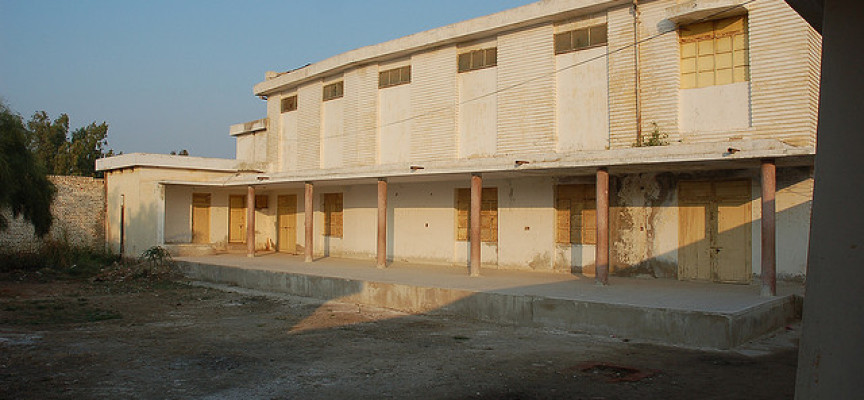Education is said to be the foundation of a successful society. In a country where ghost schools are sometimes more commonly seen than functional schools, corruption in the education sector has become a major issue and one which needs to be addressed without delay. There are so many problems plaguing Pakistan’s schools and universities anyone who takes on the challenge would be hard pressed to find a starting point. However, with determination and honesty this issue can hopefully be solved one day.
Ghost Schools Haunting the Nation
If you Google the phrase ‘Ghost School’, Pakistan comes up within the top 10 links that the search engine retrieves. This is because it is estimated that there are between 25,000 to 50,000 ghost schools exist in the country. A ghost school is a structure that is registered in the education system as a running public school but is not currently functioning as a school. Instead of being used for imparting knowledge to the children the buildings are turned into shelters for animals or even as a place where elders gather in the evening after a hard day’s work. Anything can happen in these rundown buildings, anything but education.
Other than the depressing image of a rundown school ghost schools bring about a number of financial corruption issues in the system. Because they are registered as public schools, monthly salaries of ghost teachers, provident funds and pensions, along with pocket money for administrative work are actually funneled to the school. Where and to whom this money goes to is anyone’s guess. Bribery and connections are often used to get people illegally appointed as teachers who benefit from this shameful system.
Fake Degrees in the Country
The scandal of fake degrees of top parliamentarians was only forgotten once cricket fever hit the nation. However, the problem still exists and continues to affect the effectiveness of our leaders. The Supreme Court caused an uproar when they asked the countries 1,170 parliamentarians to prove that they had authentic degrees. A number of extraordinary statements were made in response, including the very famous “A degree is a degree, whether it’s fake or real”. The law itself was actually removed since the Attorney General at the time said that because the adult literacy rate is only at 55%, nearly half the country would be ineligible to run for office. It was clearly stated by many who opposed this action by the Supreme Court that in a country where education is already low factors such as business and feudal ties are more important for politics than education. Many suggest that this aversion to the Supreme Court’s ruling is the main thrust behind the move to completely do away with the Higher Education Commission, which has been given the task of authenticating degrees.
There is no arguing the fact that our leaders have much to improve by way of their qualifications and experience. More importantly it must be asked how it was possible for so many fake degrees to be issued. Many people may say that in Pakistan, any document can be forged as long as you know the right people and can pay the price. We all must ask, is this the way to our nation’s future? Is this how we are to become a stronger, more successful country?
The Present and Future of Education
Currently the quality of education provided to the citizens of the country ranges dramatically from major cities to rural areas. Examples can be taken from school attendance which for the children aged 10 and above are highest in Islamabad at 85% and lowest in Jhal Magsi at 20%. The literacy rate has been improving over generations however major gaps and double standards exist for the boys versus the girls of the country.
There are so many steps that can be taken to improve the current situation. As always, problems with corruption have to be dealt with in a top down manner, starting with the leaders of the sector. The concept of ghost schools must be wiped from the face of the nation and teachers must be appointed on merit rather than on a political basis. Only educated leaders can guide others in the right directions and everyone must be willing to support the correction of the system.


our education system is very poor because of some munafiqeen. and we can improve it if we adopt simplicity.
humare mulk me sub se bari kharabi ye hai, k log dosro k naksh e qadam par chalte hai, yeh nai dekhte k agla banda sai raste par chal raha hai ya nai. hr insan ko kisi b field me woh kam karna chaiy, jis se us ki apni zameer mutmain ho, aur Allah tala b razi ho, hum ye sochty hain k fila shaks gr me bethe kama raha hai thu mere kam karne ya na karny se konsa farq pare ga, so we shoul sweep our own door first, and humen apni isslah karni chaiye n imaandari se kam karna chiye. taleem b qom ki amanat hai, so humen zati tor par amanat dar n emandar hona chiye.
doctors is fake issue,in our country everybody move towards this trend.this is the stupidity.
I Agree With Usama Mazhar!